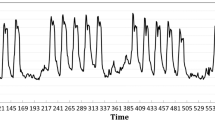Abstract
The purpose of this paper is to elaborate a new generation scheduling algorithm in the interconnected power systems. Typically, the generation scheduling problem as a mixed integer non-linear programming can be effectively solved by the generalized Benders decomposition technique which decouples an original problem into the master problem and subproblems to tremendously allow fast and accurate solutions of large-scale problems. In order to formulate efficient inter-temporal optimal power flow (OPF) subproblems, we will explore a regional decomposition framework based on predictor-corrector proximal multiplier method. In fact, this scheme can find the most economic generation schedules under the power transactions for a multi-utility system without the exchange of each utility’s own private information and major disruption to existing economic dispatch or OPF adopted by individual utilities.
Similar content being viewed by others
Abbreviations
- a m , b m , c m :
-
Coefficients of fuel cost of generating unit m
- α m , β m :
-
Coefficients of start-up cost of generating unit m
- τ m :
-
Time constant for cooling rate of boiler in generating unit m
- B ij :
-
Susceptance of transmission line connecting bus i and bus j
- \({X_{m}^{\rm off}(t)}\) :
-
Number of hours the generating unit m was off-line until time period t
- \({X_{m}^{\rm on}(t)}\) :
-
Number of hours the generating unit m was on-line until time period t
- D i (t):
-
Load demand at bus i for time period t
- L ij :
-
Maximum capacity of transmission line joining bus i and bus j
- MDT m :
-
Minimum shut-down time of generating unit m
- MUT m :
-
Minimum start-up time of generating unit m
- \({P_{m}^{\rm max}}\) :
-
Upper bound on power output of generating unit m
- \({P_{m}^{\rm min }}\) :
-
Lower bound on power output of generating unit m
- SDR m :
-
Shut-down ramp rate of generating unit m
- SUR m :
-
Start-up ramp rate of generating unit m
- RS(t):
-
Spinning reserve requirement for time period t
- \({s_{m}^{k}(t)}\) :
-
Constant value of variable s m (t) computed from kth iteration of unit commitment master problem
- s m (t):
-
Binary variable: s m (t) = 1 if generating unit m is on; s m (t) = 0 if not
- \({\xi_{m}^{k}(t)}\) :
-
Index for determining on/off states of generating unit m for time period t derived from inter-temporal OPF subproblems at iteration k
- \({\rho_{i}^{k}(t)}\) :
-
Lagrange multiplier (or bus incremental cost) of bus i for time period t
- p m (t):
-
Power produced by generating unit m for time period t
- δ i (t):
-
Voltage angle at bus i for time period t
- TC:
-
Total generation cost
- TCk :
-
Total generation cost at iteration k
- Z k :
-
Continuous variable which approximates fuel costs at kth iteration of unit commitment master problem
- FC m (p m (t)):
-
Fuel cost of generating unit m at power output p m (t) for time period t
- SC m (t):
-
Start-up cost of generating unit m for time period t
- M :
-
Set of all generating units
- N :
-
Set of all buses
- T :
-
Set of all dispatch time periods
- K :
-
Set of all iterations
- Ω i :
-
Set of generating units located at bus i
References
Wood AJ, Wollenberg BF (1996) Power generation, operation and control, 2nd edn. Wiley, New York
Bhattacharya K, Bollen MHJ, Daalder JE (2001) Operation of restructured power systems, 1st edn. Kluwer, New York
Guan X, Baldick R, Edwin Liu WH (1996) Integrating power system scheduling and optimal power flow. 12th Power system computation conference proceedings, pp 717–723
Batut J, Renaud A (1992) Daily generation scheduling optimization with transmission constraints: a new class of algorithms. IEEE Trans Power Syst 7(3): 982–987
Wang SJ, Shahidehpour SM, Kirschen DS, Mokhtari S, Irisarri GD (1995) Short-term generation scheduling with transmission and environmental constraints using an augmented Lagrangian relaxation. IEEE Trans Power Syst 10(3): 1294–1301
Beltran C, Heredia FJ (2002) Unit commitment by augmented Lagrangian relaxation: testing two decomposition approaches. J Optim Theory Appl 112(2): 295–314
Geoffrion AM (1972) Generalized Benders decomposition. J Optim Theory Appl 10(4): 237–262
Shahidehpour SM, Fu Y (2005) Benders decomposition: applying Benders decomposition to power systems. IEEE Power Energy Mag 3(2): 20–21
Ma H, Shahidehpour SM (1998) Transmission constrained unit commitment based on Benders decomposition. Int J Electr Power Energy Syst 20(4): 287–294
Lee TY, Chen CL (2007) Unit commitment with probabilistic reserve: an IPSO approach. Energy Convers Manag 48(2): 486–493
Hur D, Park JK, Kim BH (2002) Evaluation of convergence rate in the auxiliary problem principle for distributed optimal power flow. IEE Proc Gener Transm Distrib 149(5): 525–532
Kim BH (2007) An efficient implementation of decentralized optimal power flow. J Electr Eng Technol 2(3): 335–341
Rockafellar RT (1970) Convex analysis. Princeton University Press, Princeton
Han SM, Chung KH, Kim BH (2011) ISO coordination of generator maintenance scheduling in competitive electricity markets using simulated annealing. J Electr Eng Technol 6(4): 431–438
Brooke A, Kendrick D, Meeraus A, Raman R (1990) GAMS user’s guide, 1st edn. The Scientific Press, Redwood City
Author information
Authors and Affiliations
Corresponding author
Rights and permissions
About this article
Cite this article
Chung, K.H., Kim, B.H. & Hur, D. A new approach to generation scheduling in interconnected power systems using predictor-corrector proximal multiplier method. Electr Eng 94, 177–186 (2012). https://doi.org/10.1007/s00202-012-0235-9
Received:
Accepted:
Published:
Issue Date:
DOI: https://doi.org/10.1007/s00202-012-0235-9




